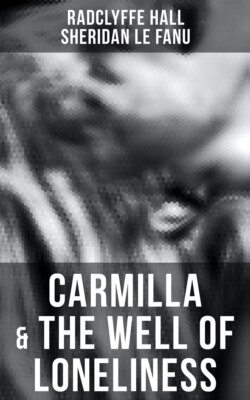Читать книгу Carmilla & The Well of Loneliness - Radclyffe Hall - Страница 22
На сайте Литреса книга снята с продажи.
1
ОглавлениеThe sorrows of childhood are mercifully passing, for it is only when maturity has rendered soil mellow that grief will root very deeply. Stephen’s grief for Collins, in spite of its violence, or perhaps because of that very violence, wore itself out like a passing tempest and was all but spent by the autumn. By Christmas, the gusts when they came were quite gentle, rousing nothing more disturbing than a faint melancholy—by Christmas it required quite an effort of will to recapture the charm of Collins.
Stephen was nonplussed and rather uneasy; to have loved so greatly and now to forget! It made her feel childish and horribly silly, as though she had cried over cutting her finger. As on all grave occasions, she considered the Lord, remembering His love for miserable sinners:
‘Teach me to love Collins Your way,’ prayed Stephen, trying hard to squeeze out some tears in the process, ‘teach me to love her ’cause she’s mean and unkind and won’t be a proper sinner that repenteth.’ But the tears would not come, nor was prayer what it had been; it lacked something—she no longer sweated when she prayed.
Then an awful thing happened, the maid’s image was fading, and try as she would Stephen could not recall certain passing expressions that had erstwhile allured her. Now she could not see Collins’ face at all clearly even if she willed very hard in the dark. Thoroughly disgruntled, she bethought her of books, books of fairy tales, hitherto not much in favour, especially of those that treated of spells, incantations and other unlawful proceedings. She even requested the surprised Mrs. Bingham to read from the Bible:
‘You know where,’ coaxed Stephen, ‘it’s the place they were reading in church last Sunday, about Saul and a witch with a name like Edna—the place where she makes some person come up, ’cause the king had forgotten what he looked like.’
But if prayer had failed Stephen, her spells also failed her; indeed they behaved as spells do when said backwards, making her see, not the person she wished to, but a creature entirely different. For Collins now had a most serious rival, one who had lately appeared at the stables. He was not possessed of a real housemaid’s knee, but instead, of four deeply thrilling brown legs—he was two up on legs, and one up on a tail, which was rather unfair on Collins! That Christmas, when Stephen was eight years old, Sir Philip had bought her a hefty bay pony; she was learning to ride him, could ride him already, being naturally skilful and fearless. There had been quite a heated discussion with Anna, because Stephen had insisted on riding astride. In this she had shown herself very refractory, falling off every time she tried the side-saddle—quite obvious, of course, this falling off process, but enough to subjugate Anna.
And now Stephen would spend long hours at the stables, swaggering largely in corduroy breeches, hobnobbing with Williams, the old stud groom, who had a soft place in his heart for the child.
She would say: ‘Come up, horse!’ in the same tone as Williams; or, pretending to a knowledge she was far from possessing: ‘Is that fetlock a bit puffy? It looks to me puffy, supposing we put on a nice wet bandage.’
Then Williams would rub his rough chin as though thinking: ‘Maybe yes—maybe no—’ he would temporize, wisely.
She grew to adore the smell of the stables; it was far more enticing than Collins’ perfume—the Erasmic she had used on her afternoons out, and which had once smelt so delicious. And the pony! So strong, so entirely fulfilling, with his round, gentle eyes, and his heart big with courage—he was surely more worthy of worship than Collins, who had treated you badly because of the footman! And yet—and yet—you owed something to Collins, just because you had loved her, though you couldn’t any more. It was dreadfully worrying, all this hard thinking, when you wished to enjoy a new pony! Stephen would stand there rubbing her chin in an almost exact imitation of Williams. She could not produce the same scrabbly sound, but in spite of this drawback the movement would soothe her.
Then one morning she had a bright inspiration: ‘Come up, horse!’ she commanded, slapping the pony, ‘Come up, horse, and let me get close to your ear, ’cause I’m going to whisper something dreadfully important.’ Laying her cheek against his firm neck she said softly: ‘You’re not you any more, you’re Collins!’
So Collins was comfortably transmigrated. It was Stephen’s last effort to remember.
